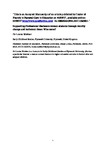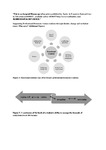'Supporting professional doctorate women students through identity change and turbulent times: who cares?'
| dc.contributor.author | Webber, Louise | |
| dc.date.accessioned | 2017-11-16T12:45:58Z | |
| dc.date.issued | 2017-09-01 | |
| dc.identifier.issn | 0264-3944 | |
| dc.identifier.issn | 1468-0122 | |
| dc.identifier.uri | http://hdl.handle.net/10026.1/10166 | |
| dc.description.abstract |
Professional doctorates are designed to enable students to blend their doctorate level study with their working lives. During the course of their studies women undergo identity change and transformation as their perspectives change, this has knock on effects at home and at work. Women students, who are mothers, also have to balance and juggle their studies with the needs of their family, this happens with various degrees of success. This paper focuses on the stories of six female students who have faced turbulent times during their professional doctorate programme. Examples of ‘turbulence’ include relationship breakdown, ill health and conflict at work because of their changing identity. It uses qualitative methods of focused interviews, using a mind mapping technique to illuminate their experiences. An interpretivist, narrative approach using Mezirow’s theory of transformation explores the tensions that occur for some women during their studies and considers the role of care in the supervisory relationship. Findings show that when women face turbulence there can be barriers that prevent them from turning to their supervisor for support. During a professional doctorate programme students can be at different points on the continuum of coping or struggling with their studies, home and professional life. Although students recognise they have a responsibility to be resilient and manage any difficulties they may have, they seek acknowledgement and empathy from their supervisor within the boundaries of a supportive, non-hierarchal relationship. | |
| dc.format.extent | 152-165 | |
| dc.language | en | |
| dc.language.iso | en | |
| dc.publisher | Taylor & Francis (Routledge) | |
| dc.subject | Clinical Research | |
| dc.title | 'Supporting professional doctorate women students through identity change and turbulent times: who cares?' | |
| dc.type | journal-article | |
| dc.type | Journal Article | |
| plymouth.issue | 3 | |
| plymouth.volume | 35 | |
| plymouth.publication-status | Published | |
| plymouth.journal | Pastoral Care in Education | |
| dc.identifier.doi | 10.1080/02643944.2017.1363812 | |
| plymouth.organisational-group | /Plymouth | |
| plymouth.organisational-group | /Plymouth/Faculty of Arts, Humanities and Business | |
| plymouth.organisational-group | /Plymouth/Faculty of Arts, Humanities and Business/Plymouth Institute of Education | |
| plymouth.organisational-group | /Plymouth/REF 2021 Researchers by UoA | |
| plymouth.organisational-group | /Plymouth/REF 2021 Researchers by UoA/UoA23 Education | |
| plymouth.organisational-group | /Plymouth/Users by role | |
| plymouth.organisational-group | /Plymouth/Users by role/Academics | |
| dcterms.dateAccepted | 2017-07-24 | |
| dc.rights.embargodate | 2019-3-1 | |
| dc.identifier.eissn | 1468-0122 | |
| dc.rights.embargoperiod | Not known | |
| rioxxterms.versionofrecord | 10.1080/02643944.2017.1363812 | |
| rioxxterms.licenseref.uri | http://www.rioxx.net/licenses/all-rights-reserved | |
| rioxxterms.licenseref.startdate | 2017-09-01 | |
| rioxxterms.type | Journal Article/Review |



